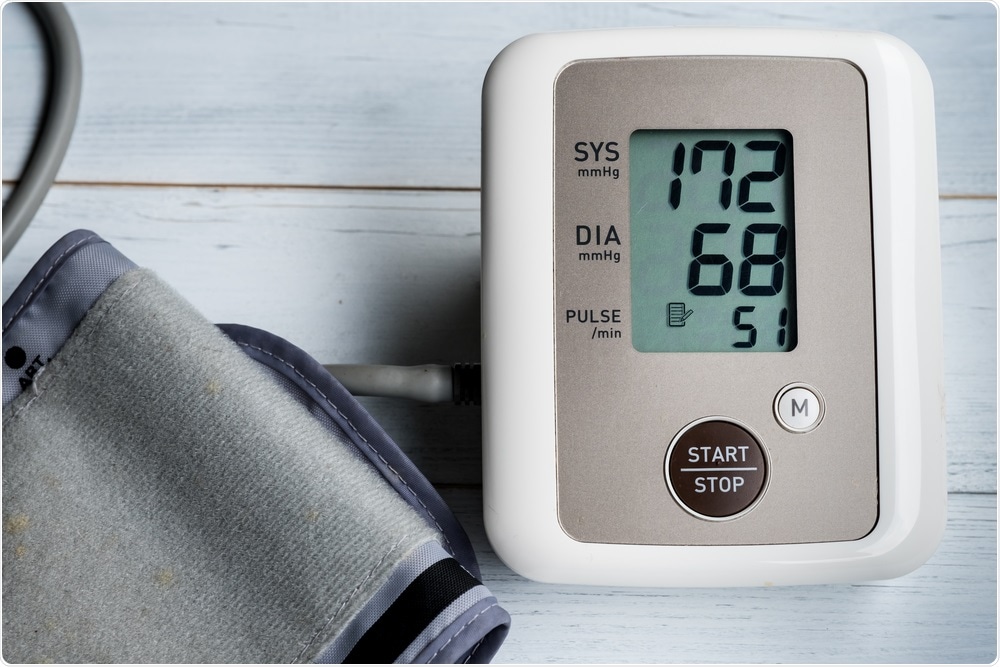A new study published in Hypertension, a journal of the American Heart Association, has found that high blood pressure at any age for any duration may contribute to cognitive decline. The study furthers our knowledge on how various factors contribute to cognitive function and may help to guide future interventions to prevent cognitive decline in those deemed at-risk.

High blood pressure. Image Credit: Voraorn Ratanakorn/Shutterstock.com
High food pressure linked with cognitive decline
High blood pressure or hypertension is extremely prevalent in the US, affecting an estimated 50% of all adults. Previously studies have demonstrated that high blood pressure is a risk factor for cognitive decline, making a person more likely to experience difficulty with attention, concentration, memory, and verbal fluency, amongst other cognitive functions. Blood pressure measuring 120 mmHg - 129 mmHg systolic or higher is classed as high, and readings above 130 mmHg systolic or above 80 mmHg diastolic are considered to be hypertension.
The researchers predicted that the impact of hypertension on cognitive function would be more significant the younger a person began suffering from hypertension. However, the results of the new study have revealed that the level of accelerated cognitive decline associated with hypertension is similar regardless of whether hypertension began in middle age or much later.
We also found that effectively treating high blood pressure at any age in adulthood could reduce or prevent this acceleration. Collectively, the findings suggest hypertension needs to be prevented, diagnosed, and effectively treated in adults of any age to preserve cognitive function.”
Sandhi M. Barreto, Professor of medicine at the Universidade Federal de Minas Gerais
Assessing the relationship between hypertension duration and cognitive function
The researchers at the Universidade Federal de Minas Gerais analyzed data collected by an existing study that collected information on cognitive health as well as good pressure of over 7,000 adults in Brazil. The average age of the patients at the beginning of the study was 59. Data were collected on the participants for an average of four years. Measures of cognitive health included tests of executive function (including attention and concentrate), memory, and verbal fluency.
The results of the analysis revealed that accelerated cognitive decline was found in those with a systolic blood pressure of 121 to 139 mmHg or diastolic blood pressure of 81 to 89 mmHg. The results also showed that the rate of cognitive decline was not impacted by the duration of hypertension. These results mean that experiencing hypertension even for a short time may influence the speed of a person’s cognitive decline. The study’s results highlight the importance of preventing high blood pressure to reduce rates of cognitive decline.
Additionally, the team found that those with uncontrolled hypertension were more likely to experience elevated levels of decline in memory and global cognitive function in comparison with those with controlled hypertension.
The importance of preventing hypertension
Barreto summarizes the importance of the study’s findings, “In addition to other proven benefits of blood pressure control, our results highlight the importance of diagnosing and controlling hypertension in patients of any age to prevent or slow down cognitive decline”. The team’s findings also stress the importance of helping people to maintain lower blood pressures to protect them from accelerated cognitive decline.
While the study has limitations due to including a relatively short follow-up period and only studying those from Brazil, the researchers believe their results are applicable across regions, particularly as previous studies corroborate what was found. There will likely be further research to explore the nature of the relationship between hypertension and cognitive decline, which will inform new strategies and interventions to help people maintain lower blood pressures over their lifetime.
Source:
- https://newsroom.heart.org/news/high-blood-pressure-at-any-age-no-matter-how-long-you-have-it-may-speed-cognitive-decline?preview=f182